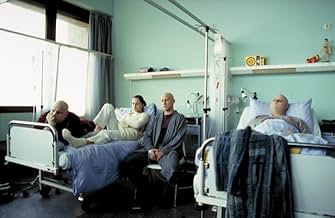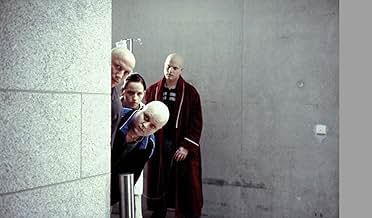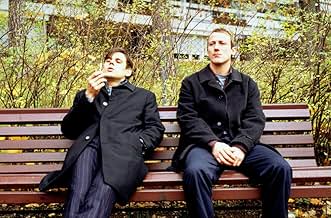Füge eine Handlung in deiner Sprache hinzuA man who loses a very personal part of his body to cancer decides he wants it back in this offbeat black comedy.A man who loses a very personal part of his body to cancer decides he wants it back in this offbeat black comedy.A man who loses a very personal part of his body to cancer decides he wants it back in this offbeat black comedy.
- Auszeichnungen
- 3 Gewinne & 1 Nominierung insgesamt
Handlung
WUSSTEST DU SCHON:
- WissenswertesWriter/director Robert Schwentke survived testicular cancer himself.
Ausgewählte Rezension
I had the good fortune of seeing the German comedy `Eierdiebe' (English title: `Family Jewels') at the 2003 Kansas City Film Fest. It was `good fortune' in more ways than one because I was fortunate to get one of the last seats in the theater before the house sold-out. I can't report how `Family Jewels' might `play in Peoria,' but Kansas City is damn near to Peoria, and I can tell you that it grabbed the packed-house from the get-go, and didn't let go until the end credits, when the audience gave it a rousing ovation.
The enthusiasm the audience displayed came as something of a surprise only because the storyline is not exactly an old-fashioned `Andy Hardy' comedy.
Imagine an Andy Hardy comedy (in German with subtitles, at that!) where Andy has his life-turned upside-down when he loses one of his gonads to testicular cancer, then undergoes Chemo, leading to a madcap chase through the nether world of a cancer ward to retrieve his lost `family jewel.' I'm not kidding, all that happens, and more!
Needless to say, `Family Jewels' is a `dark comedy' that goes where few, if any, films have dared to go! (Maybe that's not too surprising, since the filmmaker, Robert Schwentke, also made the critically praised `Tattoo' -- one of the darkest `noir killer-thrillers' around - "Tattoo" raised the stakes of `Seven' to eights and nines.)
With `Family Jewels,' Schwentke is in an equally dark place, but in a decidedly more light-hearted mood. Perhaps that's because (according to the program notes handed out at the Festival) the film is `semi-autobiographical -- Mr. Schwentke has indeed prevailed over testicular cancer.
In any event, a potentially `exploitive' subject that could have been played for crude laughs becomes an uproariously funny, but always life-affirming testament to the human spirit.
I think it was the film's affirmation of life that won over the Midwestern audience. In less capable hands, the story could have easily been an example of `gross-out' humor, but instead, it manages the nearly impossible task of looking death square in the eye, and letting go a big wad of spit!
In the Middle Ages, such `spiting in the face of death' was called `Easter Laughter" and I think that's what the Kansas City audience was cheering.
Yeah, they laughed a lot at the gallows humor, but even more, the film gave the audience the chance to join Schwentke's in his own `Easter Laugh' in the face of our common mortality without pandering to either Pollyanna optimism, or giving into a mean-spirited, bitter irony? In that, Schwentke is closer to Camus and Marcel, than to Sartre. (Since Schwentke is a German filmmaker, it's probably saying something that I was more reminded of the French existentialists than their Teutonic cohorts.)
With `Tattoo,' Schwentke proved he could make dark thrillers with the best of the `shock-meisters.' With `Family Jewels' he reveals himself to be even more in- tune to the humanist film tradition of Jean Renoir, DeSica, and Truffaut.
Well, it would be exaggerated praise to compare `Family Jewels' to, say, `Grand Illusion' or `Bicycle Thief' -- thought the film invites some comparisons to both. The cancer ward is not unlike a `prisoner-of-war' camp where categories such as race, class, and gender prove to be foolish "illusions." And the sense of loss of our hero's "family jewel," and his determination to recover that loss, did reminded me (however perversely) of `The Bicycle Thief" -- Schwentke's film is, most of all -- and in the profoundest sense -- a deeply felt film about `loss.'
If Schwentke's film brings to mind the great "humanist" filmmakers, it's in the small moments of the film, when he extends a scene a few seconds beyond the `usual' conclusion to add an unexpected `grace note' - as when a seemingly hard-as-nails doctor or nurse, who've appeared to be Nurse Ratched-like stock- characters, display (out-of-sight of their cancer patients) the grief-process they have come to hide, but always live with -- or in the extended camera time the filmmaker gives to the hero's hopelessly bourgeois mother and father who appears incapable of communicating any sense of the enormity of the situation. But then, Swekenke holds his camera steady a second longer than we expect, to capture their private, silent screams, and unvoiced prayers.
It's quite a remarkable movie. I hope you get to see it. It's a `jewel' to be treasured.
The enthusiasm the audience displayed came as something of a surprise only because the storyline is not exactly an old-fashioned `Andy Hardy' comedy.
Imagine an Andy Hardy comedy (in German with subtitles, at that!) where Andy has his life-turned upside-down when he loses one of his gonads to testicular cancer, then undergoes Chemo, leading to a madcap chase through the nether world of a cancer ward to retrieve his lost `family jewel.' I'm not kidding, all that happens, and more!
Needless to say, `Family Jewels' is a `dark comedy' that goes where few, if any, films have dared to go! (Maybe that's not too surprising, since the filmmaker, Robert Schwentke, also made the critically praised `Tattoo' -- one of the darkest `noir killer-thrillers' around - "Tattoo" raised the stakes of `Seven' to eights and nines.)
With `Family Jewels,' Schwentke is in an equally dark place, but in a decidedly more light-hearted mood. Perhaps that's because (according to the program notes handed out at the Festival) the film is `semi-autobiographical -- Mr. Schwentke has indeed prevailed over testicular cancer.
In any event, a potentially `exploitive' subject that could have been played for crude laughs becomes an uproariously funny, but always life-affirming testament to the human spirit.
I think it was the film's affirmation of life that won over the Midwestern audience. In less capable hands, the story could have easily been an example of `gross-out' humor, but instead, it manages the nearly impossible task of looking death square in the eye, and letting go a big wad of spit!
In the Middle Ages, such `spiting in the face of death' was called `Easter Laughter" and I think that's what the Kansas City audience was cheering.
Yeah, they laughed a lot at the gallows humor, but even more, the film gave the audience the chance to join Schwentke's in his own `Easter Laugh' in the face of our common mortality without pandering to either Pollyanna optimism, or giving into a mean-spirited, bitter irony? In that, Schwentke is closer to Camus and Marcel, than to Sartre. (Since Schwentke is a German filmmaker, it's probably saying something that I was more reminded of the French existentialists than their Teutonic cohorts.)
With `Tattoo,' Schwentke proved he could make dark thrillers with the best of the `shock-meisters.' With `Family Jewels' he reveals himself to be even more in- tune to the humanist film tradition of Jean Renoir, DeSica, and Truffaut.
Well, it would be exaggerated praise to compare `Family Jewels' to, say, `Grand Illusion' or `Bicycle Thief' -- thought the film invites some comparisons to both. The cancer ward is not unlike a `prisoner-of-war' camp where categories such as race, class, and gender prove to be foolish "illusions." And the sense of loss of our hero's "family jewel," and his determination to recover that loss, did reminded me (however perversely) of `The Bicycle Thief" -- Schwentke's film is, most of all -- and in the profoundest sense -- a deeply felt film about `loss.'
If Schwentke's film brings to mind the great "humanist" filmmakers, it's in the small moments of the film, when he extends a scene a few seconds beyond the `usual' conclusion to add an unexpected `grace note' - as when a seemingly hard-as-nails doctor or nurse, who've appeared to be Nurse Ratched-like stock- characters, display (out-of-sight of their cancer patients) the grief-process they have come to hide, but always live with -- or in the extended camera time the filmmaker gives to the hero's hopelessly bourgeois mother and father who appears incapable of communicating any sense of the enormity of the situation. But then, Swekenke holds his camera steady a second longer than we expect, to capture their private, silent screams, and unvoiced prayers.
It's quite a remarkable movie. I hope you get to see it. It's a `jewel' to be treasured.
Top-Auswahl
Melde dich zum Bewerten an und greife auf die Watchlist für personalisierte Empfehlungen zu.
Details
- Erscheinungsdatum
- Herkunftsland
- Offizieller Standort
- Sprache
- Auch bekannt als
- The Family Jewels
- Drehorte
- Produktionsfirmen
- Weitere beteiligte Unternehmen bei IMDbPro anzeigen
- Laufzeit1 Stunde 27 Minuten
- Farbe
- Sound-Mix
Zu dieser Seite beitragen
Bearbeitung vorschlagen oder fehlenden Inhalt hinzufügen




























